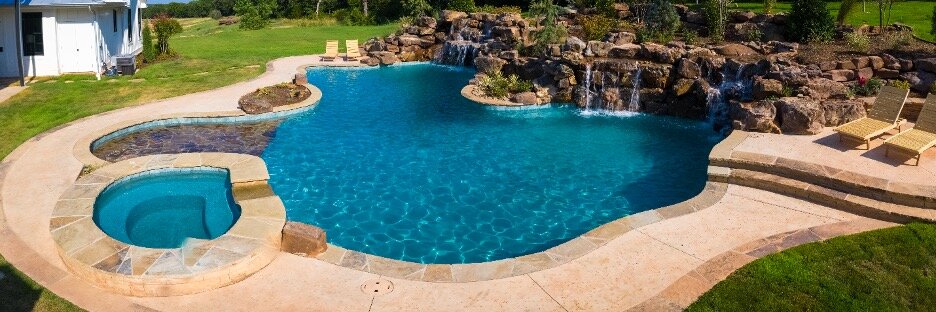Chlorine Pools and Saltwater Pools: What’s the Difference?
We get asked often to explain the differences between traditional chlorine pools and saltwater pools. What are the differences? What are the costs? Does the water feel different? These are some of the main questions. Let me explain.
What is the main difference between a chlorine pool and a saltwater pool?
First, a saltwater pool is not a chlorine free pool. The main difference is how the chlorine gets to your pool. In the more traditional form, chlorine is delivered to your pool through granular chlorine and/or chlorine tablets in an erosion feeder. With saltwater, saltwater is moved through a chlorine generator, converting the salt to chlorine.
Can you explain how the equipment for each system works?
Most traditional chlorine pools are equipped with an erosion feeder. It is a tower that holds 3” chlorine tablets. Water flows through the feeder at a given amount rate, slowly eroding the tablets and returning the chlorine to the pool. There are also chlorine floaters that can be used in the pool that work the same basic way. Saltwater pools use a chlorine generator. Salt is dissolved into the pool and that water is transferred through the chlorine generator converting it to chlorine and sending it back to the pool.
Salt Cell
Chlorinator
Do saltwater systems require more maintenance than chlorine systems?
Yes. Chlorinators require very little maintenance, just a check when you are adding tablets to make sure there are no leaks. Salt cells require that the blades get cleaned about every 6 months in order for scale to be removed allowing the cell to properly work. They also have a lifespan of about 5 years before they need to be replaced, assuming that proper water chemistry has been maintained. Both systems allow you to adjust the amount of chlorine that gets sent back to your pool. Salt systems also are unable to produce chlorine in colder temperatures requiring the use of a floater to sanitize the pool over the winter months.
How often are chemicals added to the pool?
Chlorine feeders require you to add tablets about once a week depending on how quickly the tablets are eroding. Saltwater pools require an initial dose of salt, then a boost every so often. The salt cell needs a certain amount of dissolved salt to work. Too much or too little and it cannot do its job. Both systems still require regular water checks and that the alkalinity and pH continue to be maintained with the use of Alk up, pH up and muriatic acid. They also both will need to be shocked with granular chlorine based on usage. It is recommended that all pools also be checked for phosphates, hardness, stabilizer and metals as well. Salt water pools tend to have higher pH making it harder to keep the chemicals in balance.
With a saltwater system, it is also much more difficult to maintain balanced alkalinity and pH. Chlorinating with saltwater is much like chlorinating with liquid chlorine – they both have high pH levels. If you do not keep your pH and alkalinity in balance (7.2-7.6) then you are going to create problems with scaling and chlorine lock (chlorine not being able to work due to high basisity of the water). Lack of pH management can cause a salt cell to fail in less than 90 days, can scale the pool plaster and tile line, thus causing very costly repairs. Since pH and alkalinity are both lowered with muriatic acid, the saltwater system makes it very difficult to keep that in balance as well.
Does the water feel differently with a salt pool?
Yes. Saltwater is a softer water and can be better for your skin. However, there is a product call Supreme Plus that can be added to a chlorine pool to give you the same feel as a saltwater pool. Supreme Plus has a lot of benefits for saltwater pools and chlorine pools.
Is saltwater hard on equipment and materials?
Yes. Saltwater can be corrosive to equipment and materials. It tends to damage natural stone around the pool and can harm equipment in just a short amount of time. The salt water can also cause discoloration of plaster and tile in the pool. Again, a very costly repair.
Are these the only ways to sanitize your pool?
Yes and no: We recommend getting chlorine form one or the other for all pools. There are things such as UV light and Ozone that can be added, usually to chlorine pools, that allow a secondary sanitizer to enter your water, thus giving you just one more defense against contaminants. These are considered secondary sources and should still be paired with chlorine of some type.
What does Aquascape recommend?
We at Aquascape Pools recommend a traditional chlorine system with a secondary sanitizer such as an ozonator. We have found these to be easier to maintain overall. It is easier to keep chemicals balanced, equipment in tip-top shape and isn’t hard on materials overall. We do understand the benefits of salt water and will certainly install them at the request of the customer, however, the customer will be made aware that warranties on materials and equipment may be voided if it is determined that the damage is caused by the salt system.





